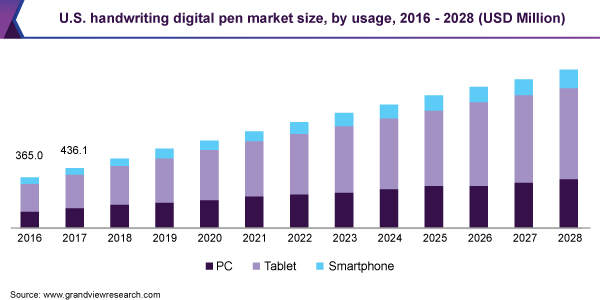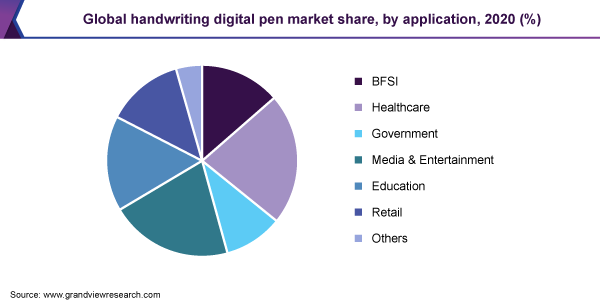- Home
- »
- Electronic & Electrical
- »
-
Handwriting Digital Pen Market Share Report, 2021-2028GVR Report cover
![Handwriting Digital Pen Market Size, Share & Trends Report]()
Handwriting Digital Pen Market (2021 - 2028) Size, Share & Trends Analysis Report By Usage (PC, Tablet, Smartphone), By Application (BFSI, Healthcare, Govt.), By Region (Asia Pacific, North America), And Segment Forecasts
- Report ID: GVR-4-68039-377-3
- Number of Report Pages: 80
- Format: PDF
- Historical Range: 2016 - 2019
- Forecast Period: 2021 - 2028
- Industry: Consumer Goods
- Report Summary
- Table of Contents
- Interactive Charts
- Methodology
- Download FREE Sample
-
Download Sample Report
Report Overview
The global handwriting digital pen market size was valued at USD 2.52 billion in 2020 and is anticipated to grow at a compound annual growth rate (CAGR) of 8.3% from 2021 to 2028. The growing need to digitize businesses in various sectors, including banking, healthcare, education, and retail, is expected to have a positive impact on market growth. It has been proved that digitization enhances productivity and helps in gaining an edge over competitors. Handwriting digital pens have been gaining significant traction across the globe owing to the rising adoption of e-learning sites and apps among students and educators. E-educators have also been striving to provide education through the online medium, offering greater convenience to students as compared to conventional offline education methods.

The outbreak of coronavirus has also driven the product demand over the last six months. The education system has changed considerably over this period. With schools all over the world shut down to avoid the spread of the virus, teaching and learning are being undertaken remotely on various digital platforms. Thus, the distinctive rise of e-learning is expected to offer lucrative growth opportunities for the market. The ease of scanning and reading documents in various languages acts as a major factor boosting the adoption of digital pens in the corporate sector.
Moreover, these tools help reduce the expenses pertaining to general office supplies, resulting in an increase in their usability among consumers. According to an article published in 2018 by Natalya Berdzeni, the executive vice president for spend management services at LAC Group, the group’s clients spend an average of USD 200 per employee annually, or USD 17 per month, on office supplies. Major consumers of paper, such as law firms, spend an average of USD 1,000 per employee annually, or USD 83 per month. Thus, to minimize the expenditure on office supplies, companies are increasingly opting for digital pens.
The emergence of digital platforms for various applications, such as banking and cloud computing, is expected to present numerous growth opportunities to key players in the market. People with high spending power are the major consumers of digital pens. Partnering with companies that offer digital equipment can open new growth avenues for the existing and new players in the market. The rising adoption of digital devices as a primary source of education in several schools worldwide is creating significant growth opportunities for the market.
Governments around the world are focusing on digitalizing the education sector and are distributing laptops and tablets, among other devices, to boost digitalization. Players in the market are partnering with other companies to develop cost-effective products. Moreover, various companies are procuring desktops and other devices on lease. They can tie up with such service providers of laptops and tablets and offer products on lease.
Usage Insights
The tablet segment dominated the market with a revenue share of over 58% in 2020. This segment is also projected to witness the highest CAGR from 2021 to 2028. The growing target population base, which includes young and tech-savvy consumers most of whom are heavily dependent on digital devices for education and business, is projected to drive the segment growth. According to a survey conducted in January 2020 by Campus Technology, 52% of college students owned tablets. The benefits of digital signatures on a tablet across industries and workplaces include fast turnaround, cost savings, workflow efficiency, strengthened security, and cloud storage.
The smartphone segment is projected to register the second-fastest CAGR from 2021 to 2028. The rising adoption of smartphones by children and high-school students, due to the growing need for a better medium of education through digital devices, has resulted in increased usage of digital pens via smartphones. Smartphone-compliant digital pens have been gaining significant traction across the globe owing to the growing reliance on e-learning sites and apps among students of all ages. E-educators have also been striving to provide education through the online medium, offering greater convenience to students as compared to conventional offline modes of education.
Application Insights
The healthcare segment led the market with a revenue share of over 22% in 2020 and is projected to grow at a steady CAGR of over 7% from 2021 to 2028. The handwriting digital pen technology is increasingly being adopted by many healthcare companies to eliminate the time consumed in tedious paperwork for recording patient information and prescriptions. Pacific Cataract and Laser Institute use Anoto’s technology as part of its NextPen electronic medical records rollout as it addresses several concerns. The technology was introduced across the organization’s six-state operating region and digital pens are being used to collect patients’ historical data and consent forms.

The BFSI segment is expected to record the fastest CAGR of more than 9.5% from 2021 to 2028. With the help of handwriting digital pens, bank tellers and clients can easily fill forms or basic information, wherein all the annotations will be automatically saved in the document. Modern banks, insurance firms, and other financial service companies are focusing on streamlining their processes to eliminate paper-based workflows to accelerate their revenue inflow and minimize the waiting time for customers. Wacom handwriting digital pens have been ensuring familiar handwritten signatures and form processing experience for financial service professionals as well as customers.
Regional Insights
North America was the dominant regional market in 2020 and accounted for a revenue share of over 32%. The rapid product adoption in countries, such as the U.S. and Canada, as a result of increased diffusion of digital technologies in the majority of businesses, is a key factor driving the market. In addition, the presence of several leading manufacturers and a well-established education sector in the U.S. are boosting the growth of the regional market. The advent of digital textbooks and notebooks has made the interface interactive. Many schools in the U.S. and Canada are adopting the system of e-exams and e-notes to improve the scenario of education, which is propelling the market growth.
Asia Pacific is projected to grow at the fastest CAGR of 9.1% over the forecast period. Countries including China and South Korea have been creating advanced products that are available to the common mass at an economical price, which has resulted in increased product popularity. Furthermore, the device has gained significant traction in countries including Japan, India, and China, where the governments are focusing on going completely digital, thereby leading to the growth of the market.
Key Companies & Market Share Insights
The market is characterized by the presence of various well-established players. The recent developments and strategic initiatives carried out by key players mainly include product launches, collaborations, and acquisitions. For instance, in October 2019, Microsoft launched a Surface Pen at the October Surface event for the Surface Pro X. The Surface Pro X is a 2-in-1, thin-and-light device that features a sleeker design than previous models and is driven by an ARM chip, with a thinner body and bezel. This strategic product launch was aimed at driving the company’s revenue growth and strengthening its position in the global market. Some of the key companies in the global handwriting digital pen market include:
-
Apple, Inc.
-
Samsung Electronics Co., Ltd.
-
Wacom Co., Ltd.
-
Microsoft Corp.
-
Huawei Technologies Co., Ltd.
-
Lenovo
-
Dell Technologies, Inc.
-
Hewlett-Packard Development Company, L.P.
-
Google LLC
-
Sony Corp.
Handwriting Digital Pen Market Report Scope
Report Attribute
Details
Market size value in 2021
USD 2.80 billion
Revenue forecast in 2028
USD 4.78 billion
Growth rate
CAGR of 8.3% from 2021 to 2028
Base year for estimation
2020
Historical data
2016 - 2019
Forecast period
2021 - 2028
Quantitative units
Volume in million units, revenue in USD million/billion, and CAGR from 2021 to 2028
Report coverage
Volume forecast, revenue forecast, company ranking, competitive landscape, growth factors, and trends
Segments covered
Usage, application, region
Regional scope
North America; Europe; Asia Pacific; Central & South America; Middle East & Africa
Country scope
U.S.; Germany; U.K.; China; India; Japan; Brazil
Key companies profiled
Apple Inc.; Samsung Electronics Co. Ltd; Huawei Technologies Co. Ltd.; Lenovo; Sony Corporation; Wacom Co. Ltd.; Google LLC; Dell Technologies Inc.; Microsoft Corporation; and Hewlett-Packard Development Company L.P.
Customization scope
Free report customization (equivalent up to 8 analysts working days) with purchase. Addition or alteration to country, regional & segment scope.
Pricing and purchase options
Avail customized purchase options to meet your exact research needs. Explore purchase options
Segments Covered in the ReportThis report forecasts revenue growth at global, regional, and country levels and provides an analysis of the latest industry trends in each of the sub-segments from 2016 to 2028. For the purpose of this study, Grand View Research has segmented the global handwriting digital pen market report on the basis of usage, application, and region:
-
Usage Outlook (Volume, Million Units; Revenue, USD Million, 2016 - 2028)
-
PC
-
Tablet
-
Smartphone
-
-
Application Outlook (Volume, Million Units; Revenue, USD Million, 2016 - 2028)
-
BFSI
-
Healthcare
-
Government
-
Media & Entertainment
-
Education
-
Retail
-
Others
-
-
Regional Outlook (Volume, Million Units; Revenue, USD Million, 2016 - 2028)
-
North America
-
U.S.
-
-
Europe
-
Germany
-
U.K.
-
-
Asia Pacific
-
China
-
India
-
Japan
-
-
Central & South America
-
Brazil
-
-
Middle East & Africa
-
Frequently Asked Questions About This Report
b. The global handwriting digital pen market size was estimated at USD 2.52 billion in 2020 and is expected to reach USD 2.80 billion in 2021.
b. The global handwriting digital pen market is expected to grow at a compound annual growth rate of 8.3% from 2021 to 2028 to reach USD 4.78 billion by 2028.
b. The tablet segment dominated the handwriting digital pen market with a revenue share of over 58% in 2020.
b. Some key players operating in the global handwriting digital pen market include Wacom Co., Ltd.; Lenovo; Microsoft Corporation; and Sony Corporation, among others.
b. The key factor that is driving the global handwriting digital pen market growth includes the rising need to digitize businesses in various sectors, including banking, healthcare, education, and retail.
b. The healthcare segment led the handwriting digital pen market with a revenue share of over 22% in 2020 and is projected to grow at a steady CAGR of over 7% from 2021 to 2028.
b. North America was the dominant regional handwriting digital pen market in 2020 and accounted for a revenue share of over 32%.
Share this report with your colleague or friend.
Need a Tailored Report?
Customize this report to your needs — add regions, segments, or data points, with 20% free customization.

ISO 9001:2015 & 27001:2022 Certified
We are GDPR and CCPA compliant! Your transaction & personal information is safe and secure. For more details, please read our privacy policy.
Trusted market insights - try a free sample
See how our reports are structured and why industry leaders rely on Grand View Research. Get a free sample or ask us to tailor this report to your needs.










